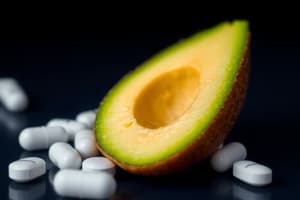Podcast
Questions and Answers
What is a potential consequence of taking an MAOI with tyramine-rich foods?
What is a potential consequence of taking an MAOI with tyramine-rich foods?
- Increased metabolism of catecholamines
- Hypertensive crisis (correct)
- Inhibition of tyramine release
- Decreased absorption of nutrients
How does calcium in milk interact with certain antibiotics?
How does calcium in milk interact with certain antibiotics?
- Enhances the effectiveness of the antibiotics
- Increases their side effects
- Neutralizes the antibiotics
- Decreases the absorption of the antibiotics (correct)
What effect does excessive vitamin K intake have when taking warfarin?
What effect does excessive vitamin K intake have when taking warfarin?
- Increases warfarin effect
- Causes vitamin D deficiency
- Decreases warfarin effect (correct)
- No interaction is observed
What is the effect of grapefruit juice on certain medications?
What is the effect of grapefruit juice on certain medications?
What impact do high fiber foods have on drugs like atorvastatin?
What impact do high fiber foods have on drugs like atorvastatin?
How does folic acid interact with antiepileptic drugs?
How does folic acid interact with antiepileptic drugs?
What substance can lead to depletion of folic acid when taken with antibiotics?
What substance can lead to depletion of folic acid when taken with antibiotics?
What is the result of antacids interacting with folic acid?
What is the result of antacids interacting with folic acid?
What effect does ascorbic acid have when combined with aspirin?
What effect does ascorbic acid have when combined with aspirin?
Which drug interaction leads to vitamin B6 deficiency?
Which drug interaction leads to vitamin B6 deficiency?
What happens to vitamin D levels when using a CYP450 inducer like phenytoin?
What happens to vitamin D levels when using a CYP450 inducer like phenytoin?
Which of the following drugs can interfere with the absorption of calcium?
Which of the following drugs can interfere with the absorption of calcium?
What is a consequence of taking NSAIDs chronically in relation to iron?
What is a consequence of taking NSAIDs chronically in relation to iron?
What can cause hypokalemia in patients?
What can cause hypokalemia in patients?
Which combination of substances binds iron and affects its absorption?
Which combination of substances binds iron and affects its absorption?
Which antibiotic can decrease the bioavailability of zinc?
Which antibiotic can decrease the bioavailability of zinc?
Flashcards
Ascorbic acid and aspirin interaction
Ascorbic acid and aspirin interaction
Ascorbic acid (vitamin C) can reduce mucosal damage and gastric acidity caused by aspirin-generated free radicals.
Ascorbic acid and oral contraceptives
Ascorbic acid and oral contraceptives
Ascorbic acid can increase serum estrogen levels, potentially leading to adverse reactions in women taking oral contraceptives.
Vitamin B complex and drug interactions
Vitamin B complex and drug interactions
Certain medications can affect the absorption and blood levels of vitamin B complex, leading to deficiencies.
Vitamin D and CYP450 inducers
Vitamin D and CYP450 inducers
Signup and view all the flashcards
Vitamin D and absorption interference
Vitamin D and absorption interference
Signup and view all the flashcards
Vitamin K and warfarin interaction
Vitamin K and warfarin interaction
Signup and view all the flashcards
Calcium and drug interactions
Calcium and drug interactions
Signup and view all the flashcards
Iron and chelating agents
Iron and chelating agents
Signup and view all the flashcards
MAOI-Tyramine Interaction
MAOI-Tyramine Interaction
Signup and view all the flashcards
Milk and Dairy Products - Antibiotic Interaction
Milk and Dairy Products - Antibiotic Interaction
Signup and view all the flashcards
Warfarin - Vitamin K Interaction
Warfarin - Vitamin K Interaction
Signup and view all the flashcards
Grapefruit Juice - Drug Interaction
Grapefruit Juice - Drug Interaction
Signup and view all the flashcards
Fiber - Drug Interaction
Fiber - Drug Interaction
Signup and view all the flashcards
Caffeine - Drug Interaction
Caffeine - Drug Interaction
Signup and view all the flashcards
B-Carotene - Drug Interaction
B-Carotene - Drug Interaction
Signup and view all the flashcards
Folic Acid - Antiepileptic Drug Interaction
Folic Acid - Antiepileptic Drug Interaction
Signup and view all the flashcards
Study Notes
Drug-Food Interactions
-
MAOI + tyramine in food: Increases blood tyramine levels, leading to uncontrolled catecholamine release. This can cause a hypertensive crisis with symptoms including hypertension, headache, tachycardia, arrhythmia, and stroke.
-
Milk and dairy products + tetracycline/ciprofloxacin: Forms a chelate, reducing antibiotic absorption and effectiveness.
-
Warfarin + vitamin K-rich foods: Excessive vitamin K intake reduces warfarin's anticoagulant effect, increasing the risk of thrombosis. Examples of high vitamin K foods are foods like bran, liver, spinach, broccoli, cabbage, and lettuce.
-
Grapefruit juice + drugs: Grapefruit juice inhibits CYP3A4 in the small intestine and liver, reducing drug metabolism. This leads to higher blood levels of the drug, increasing its effects and potential side effects.
-
Drugs + fiber: Fiber reduces the absorption of certain drugs, decreasing their serum levels and effectiveness.
-
Drugs + caffeine: Some drugs slow the metabolism of caffeine, leading to higher blood levels and potentially excessive nervous system (CNS) or cardiovascular effects.
Drug-Vitamin Interactions
-
B-carotene + drugs: Certain drugs (antibiotics, laxatives, cholesterol-lowering drugs) interfere with the absorption of fat-soluble vitamins including B-carotene and ADEK. This reduces absorption and blood levels.
-
Folic acid + antiepileptic drugs: Antiepileptic drugs (e.g., phenytoin) inhibit folate absorption and can also induce CYP450 enzymes. Antacids also interfere with folate absorption.
-
Ascorbic acid + aspirin: Aspirin can increase the damage to the gastrointestinal tract. Ascorbic acid can affect estrogen levels in oral contraceptives which can cause adverse reactions.
-
Vitamins + oral contraceptives/isoniazid/cyclosporine: These drugs can reduce absorption and blood levels of some vitamins, leading to deficiencies (e.g. vitamin B6 deficiency). This can lead to anemia and peripheral neuropathy.
Drug-Mineral Interactions
-
Calcium + drugs: Drugs like aluminum- or magnesium-containing antacids, cholestyramine, tetracyclines, quinolones, and corticosteroids, reduce calcium absorption. Phenytoin or Phenobarbital also decrease calcium absorption.
-
Iron + drugs: Chelating agents (e.g., clofibrate, deferoxamine, dimercaprol, EDTA), and quinolones reduce iron absorption. Aspirin or NSAIDs (non-steroidal anti-inflammatory drugs) can increase the risk of gastrointestinal bleeding and iron deficiency anemia. Iron (non-heme) binds to polyphenols and tannins in coffee, black tea leading to poor absorption of iron. This is important for infants children, pregnant, and lactating women.
-
Potassium + drugs: Some drugs (e.g., amphotericin B, colchicine, corticosteroids, laxatives, ACE inhibitors, losartan, spironolactone, cyclosporine) can either decrease or increase potassium levels (hyper/hypokalemia), potentially leading to cardiotoxicity.
-
Zinc + drugs: Drugs like ciprofloxacin and tetracyclines can reduce the absorption and bioavailability of zinc.
Vitamin B, K, and D Interactions
-
Vitamins + CYP450 inducers: CYP450 inducers (e.g., phenytoin, phenobarbital) affect the metabolism of vitamins D and K, leading to reduced blood levels and deficiency symptoms.
-
Drugs interfering with vitamin absorption: Drugs can interfere with absorption of vitamins, e.g. cholestyramine, neomycin, orlistat (decrease Vitamin D) and cholestyramine and mineral oil (decrease vitamin K).
-
Drugs enhancing bone mineralization: These drugs enhance effects of certain nutrients for bone mineralization (e.g. biphosphonate, estrogen/progestrin) potentially causing synergistic interactions.
Studying That Suits You
Use AI to generate personalized quizzes and flashcards to suit your learning preferences.




